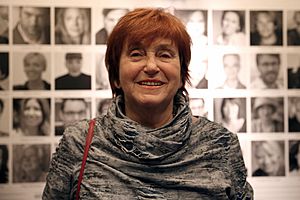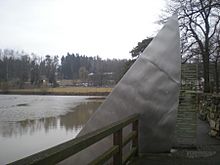Valie Export facts for kids
Valie Export (often stylized as 'VALIE EXPORT'; born 17 May 1940) is an avant-garde Austrian artist. She is best known for provocative public performances and expanded cinema work. Her artistic work also includes video installations, computer animations, photography, sculpture and publications covering contemporary art.
Contents
Early life
Valie Export was born Waltraud Lehner in Linz, Austria and was raised in Linz by a single mother of three. Export studied painting, drawing, and design at the National School for Textile Industry in Vienna.
Career
1960s and 1970s
In the late 1960s and early 1970s, Austrian feminism was forced to address the fact that by the 1970s there was still a generation of Austrians whose attitudes towards women were based on Nazi ideology. They also had to confront the guilt of their parents’ (mothers’) complacency within the Nazi regime. In 1967, she changed her name from Waltraud Hollinger to VALIE EXPORT. With this gesture of self-determination, Export emphatically asserted her identity within the Viennese art scene, which was then dominated by the taboo-breaking performance art of the Vienna Actionists such as Hermann Nitsch, Günter Brus, Otto Mühl, and Rudolf Schwarzkogler. Of the Actionist movement, Export has said, “I was very influenced, not so much by Actionism itself, but by the whole movement in the city. It was a really great movement. We had big scandals, sometimes against the politique; it helped me to bring out my ideas.”
Export's early guerrilla performances have attained an iconic status in feminist art history.
Some of her works including Invisible Adversaries, "Syntagma," and "Korpersplitter," show the artist's body in connection to historical buildings not only physically, but also symbolically. The body’s attachment to the historical progression of gendered spaces and stereotyped roles represent Export's feminist and political approach to art.
Export's groundbreaking video piece, Facing a Family (1971) was one of the first instances of television intervention and broadcasting video art. The video, originally broadcast on the Austrian television program Kontakte on 2 February 1971, shows a bourgeois Austrian family watching TV while eating dinner. When other middle-class families watched this program on TV, the television would be holding a mirror up to their experience and complicating the relationship between subject, spectator, and television.
Export published “Women’s Art: A Manifesto” in 1972. In it, she advocated for women to “speak so that they can find themselves, this is what I ask for in order to achieve a self-defined image of ourselves and thus a different view of the social function of women.” Here Export points out the unjust way that women had been living their lives within the boundaries created by men. In this same manifesto, Export also wrote “the arts can be understood as a medium of our self-definition adding new values to the arts. these values, transmitted via the cultural sign-process, will alter reality towards an accommodation of female needs”. This statement directly related her own work to the progress of empowering women.
Based on the precepts laid out in her 1972 manifesto, Export curated an exhibition of feminist art at the Galerie nachst St. Stepan in Vienna in 1975. Titled MAGNA. Feminism: Art and Creativity, this exhibition “introduced the feminist artist as curator and as contemporary art historian.”
1977 saw the release of her first feature film, Unsichtbare Gegner. For this film's script, she collaborated with her former partner, Peter Weibel. The film follows Anna, a young woman photographer, as she becomes increasingly convinced that the people around her are being taken over by the Hyksos, a hostile alien force. Her delusion, the film reveals, is caused by internalized behavioral expectations for herself as a woman that run counter to her true desires.
1980s to present
In her 1983 experimental film, Syntagma, Export attempted to reframe the female body by using a multitude of "...different cinematic montage techniques—doubling the body through overlays, for example". The film follows Export's belief that the female body has, throughout history, been manipulated by men through the means of art and literature. In an interview with Interview magazine, Export discusses her movie, Syntagma, and says, "The female body has always been a construction".
Her 1985 film The Practice of Love was entered into the 35th Berlin International Film Festival.
Since 1995/1996 Export has held a professorship for multimedia performance at the Academy of Media Arts Cologne.
In 2016, the city of Linz acquired her archive and opened a research center devoted to her work.
Bard College hosted an exhibition centered around Export’s 1977 film Unsichtbare Gegner in 2016. The show featured work by Export as well as artists for whom Export’s art “blew open doors: Lorna Simpson, K8 Hardy, Hito Steyerl, Trisha Donnelly and Emily Jacir, among others.”
In 2019, Export won the Roswitha Haftmann Prize of £120,000, which is “Europe’s largest single-award art prize.”
Russia's war against Ukraine
In February 2023, Valie Export was one of the initial signers of a widely publicized petition calling for an end of military support to Ukraine in the wake of the 2022 Russian invasion of Ukraine. [citation needed!]
Works
- Selected filmography
- Splitscreen - Solipsismus (1968)
- INTERRUPTED LINE (1971)
- ...Remote…Remote... (1973)
- Mann & Frau & Animal (1973)
- Adjungierte Dislokationen (1973)
- Invisible Adversaries (Unsichtbare Gegner, 1976)
- Menschenfrauen (1977)
- Syntagma (1983)
- The Practice of Love (Die Praxis der Liebe, 1984)
- I turn over the pictures of my voice in my head (2008)
Awards
- 1990: City of Vienna Prize for Visual Arts
- 1992: Austrian Prize for video and media art
- 1995: Sculpture Award at the Generali Foundation
- 1997: Gabriele Münter Prize
- 2000: Oskar Kokoschka Prize
- 2000: Alfred Kubin Prize Big Price culture of Upper Austria
- 2003: Gold Medal for services to the City of Vienna
- 2005: Austrian Decoration for Science and Art
- 2009: Honorary Doctorate of the University of Arts and Industrial Design Linz
- 2010: Grand Gold Decoration for Services to the Republic of Austria
- 2019: 19th Roswitha Haftmann Prize
- 2020: Golden Nica Visionary Pioneer of Feminist Media Art Prix Ars Electronica
- 2021: Honorary Fellowship of the Royal Photographic Society
See also
 In Spanish: Valie Export para niños
In Spanish: Valie Export para niños




